Do your friends often debate: are gamers nerds or geeks? Around 80% of people today play video games, yet the words “nerds” and “geeks” still stick to many players. This article will explore nine key traits to help you see where gaming fits within nerdy or geek culture in 2025.
The answers may surprise you—keep reading to learn more!
Key Takeaways
In 2025, about 80% of people play video games, showing gaming is now common and not limited to “nerds” or “geeks.” Platforms like Twitch, Discord, and esports communities highlight rich social connections among diverse gamers.
Nerds often focus deeply on facts and intellectual interests such as coding or strategy. Geeks openly celebrate passions like comics, tech gadgets from Razer, Marvel action figures, Funko Pop toys, anime cosplay at Comic-Con events, tabletop RPGs like Dungeons & Dragons (1974), and streaming gameplay online.
Stereotypes depicting gamers as socially awkward outsiders are fading. Movies (“Ready Player One”, 2018) and series (“Arcane”, Netflix’s League of Legends show in 2021) now portray gaming culture positively. Gamers today can include casual players on mobile apps or dedicated fans with high-end PCs playing complex titles (“Elden Ring,” “Final Fantasy XVI”).
Gaming develops valuable skills used beyond play: surgeons benefit from precise movements learned in games; soldiers train via realistic game-based technology; popular strategic games like Civilization teach risk assessment similar to chess (Gary Gygax quote). By 2027 nearly 75% of Gen Z will regularly engage in digital gaming activities impacting their daily lives significantly.
Gamer identity spans across broad interests ranging widely from NASA missions such as Mars rover Perseverance landing (Feb. 2021), outdoor sports including skateboarding or hiking national parks—to creative hobbies building personalized robots using Raspberry Pi computers—increasingly challenging outdated gamer stereotypes historically depicted since the ’80s-’90s era media portrayals.
Table of Contents
Defining Nerds and Geeks
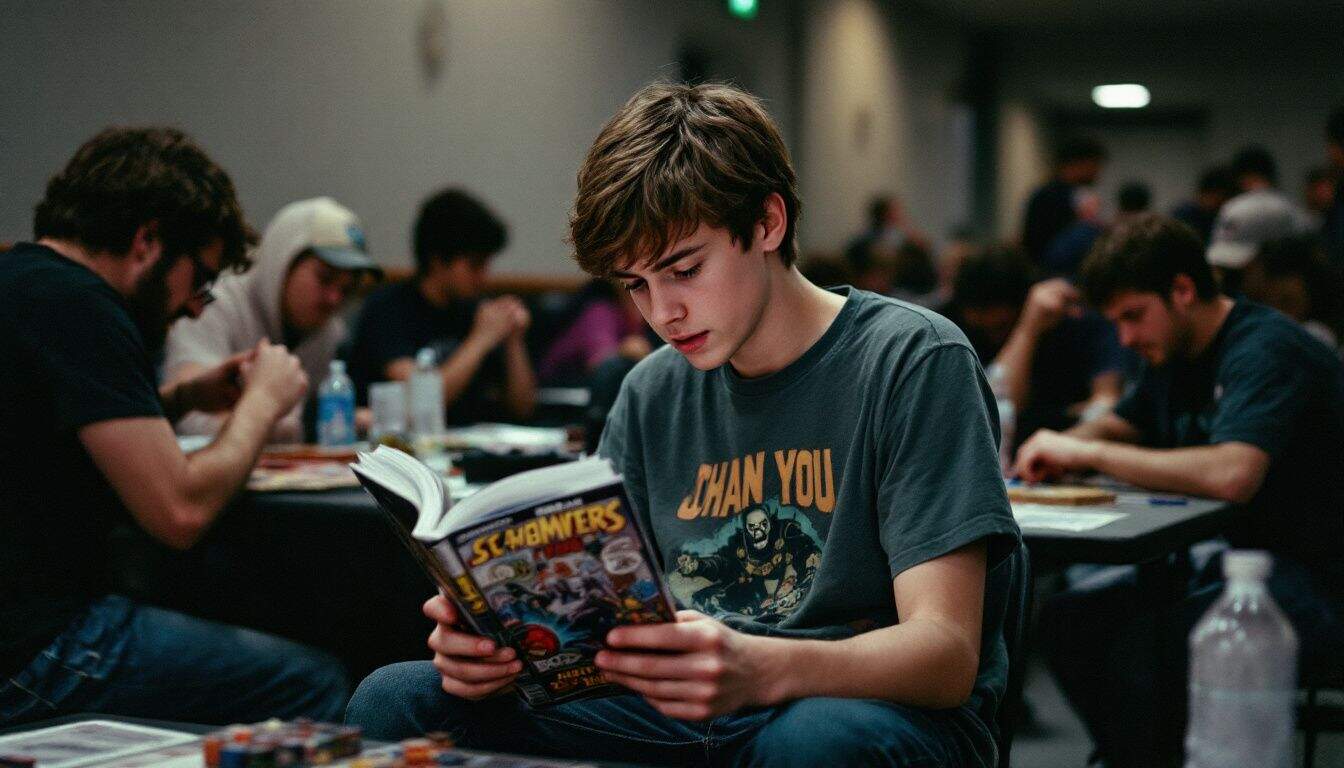
Nerds often dive deep into topics like strategy games or coding, driven by facts and detailed knowledge. Geeks embrace hobbies such as PC gaming or pop culture events with excitement, openly showing their passion.
Characteristics of Nerds
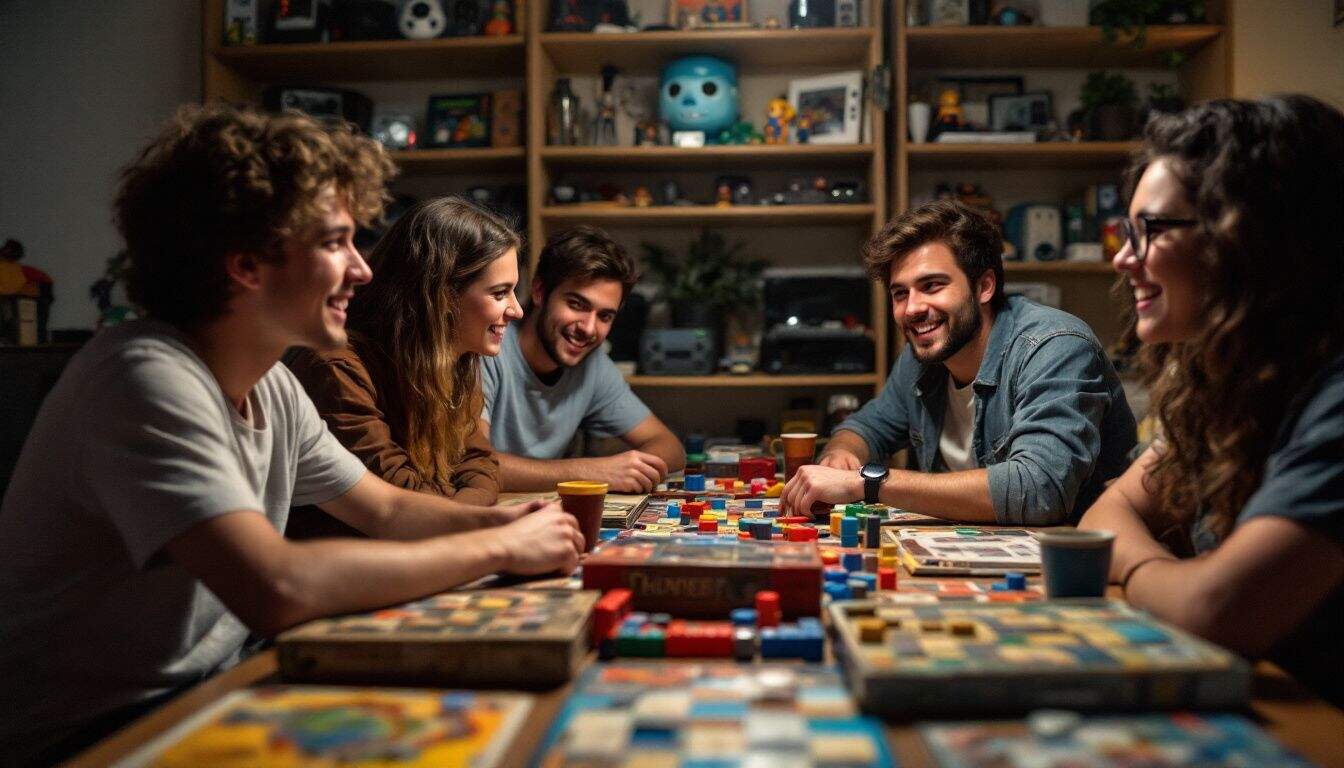
Gamers often get called nerds—but what does that mean today? The meaning has changed over the years, evolving with pop culture and society’s views.
- Intellectual curiosity drives many nerds, who enjoy understanding complex topics or solving puzzles. For gamers, this means mastering strategic games like “Warcraft: Orcs & Humans” through careful planning and skill.
- Having a detail-oriented nature is common among nerds, who focus closely on specifics and small elements others might overlook. Gaming forums show how hardcore video game enthusiasts analyze every tiny detail of gameplay mechanics.
- Nerdiness tends to align strongly with academic interests, such as math, science, or technology subjects at school or university. Many nerds excel in these fields due to their love of learning and careful attention.
- A passion for knowledge can sometimes lead to social awkwardness—a common trait portrayed in movies and TV shows about nerddom. Though exaggerated by media portrayals, some nerd personalities do find social interactions more difficult.
- Negative stereotypes still exist about nerds being arrogant or smug because of their intelligence. Popular media used to depict them this way frequently; now, however, many portrayals highlight brains as an asset rather than something embarrassing.
- Nerd identity often involves enthusiasm for collecting objects related directly to personal interests—like action figures from favorite games or rare editions of fantasy novels.
- Nerdy communities share strong bonds centered around intellectual activities—such as book clubs devoted entirely to sci-fi literature discussions or groups exploring non-mainstream hobbies online like “UK casinos not on Gamstop“.
- Digital platforms play a huge role in modern nerddom, giving people chances to connect easily around niche ideas, no matter where they live geographically—gaming forums being one clear example here too.
- Lastly embracing your unique brand of nerdiness matters greatly: self-acceptance improves confidence levels while helping challenge old-fashioned social stigmas associated with labels often tied negatively toward gamer culture (“fanboy” would be one).
Traits of Geeks

While nerds tend to focus deeply on knowledge and academics, geeks channel their energy into passionate hobbies. Geeks proudly show enthusiasm, dedication, and social connection linked with their interests.
- Geeks become huge fans of specific hobbies or fandoms, from “Star Wars” movies to Marvel comic books.
- They love collecting tangible items tied closely with their interests—comic action figures, special edition games for PlayStation 5, or limited release Funko Pop toys.
- Geeks frequently display obsessive behaviors like lining shelves with LEGO models or owning every expansion pack for “Magic: The Gathering.”
- Enthusiasm clearly drives geeks: they’re eager to line up overnight at Comic-Con events or special gaming launches.
- Conventions like E3 and PAX often find geeks sharing personal stories firsthand about favorite franchises in detailed cosplay costumes.
- Social connections help define geek culture; online forums on Discord or Reddit connect them instantly with others who share similar passions.
- Geek identity values community; groups often meet weekly for board game nights using games like Catan or Dungeons & Dragons campaigns.
- Streaming platforms such as Twitch and YouTube Gaming offer geek communities a vibrant space where they discuss strategies and highlight gameplay moments socially.
- Technology excites many geeks—new gaming headsets from Razer or the latest graphics cards spark lively dialogues online within tech forums and chat groups.
- Finally, geeks typically welcome newcomers openly into their group chats, clubs, guilds—as passion shared creates lasting bonds within fan communities everywhere today in 2025.
The Connection Between Gaming and Nerd Culture
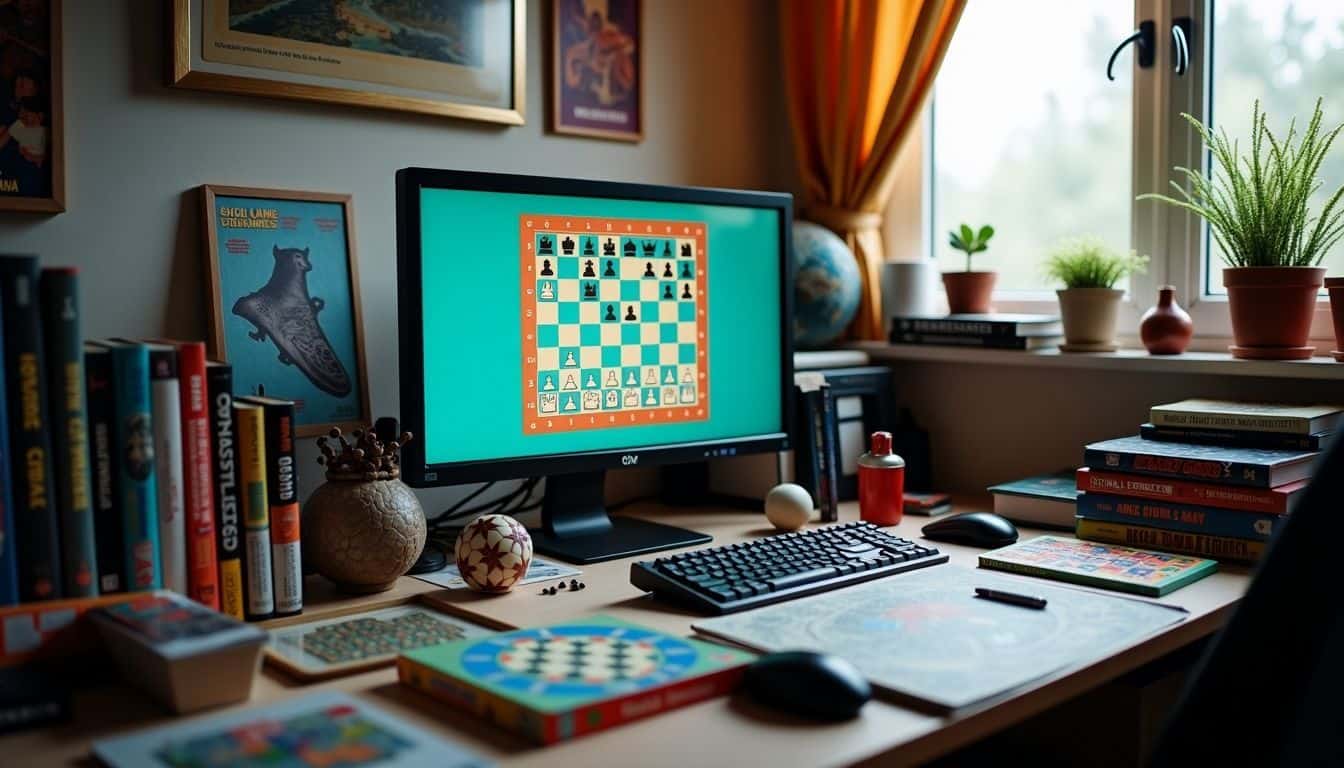
Gaming blends smoothly with nerd culture, combining strategic gameplay and puzzle-solving skills that attract thoughtful minds. Many people recognize gamers as nerds due to games like chess or complex strategy video games that challenge deep thinking and problem-solving abilities.
Intellectual and Strategic Aspects of Gaming

Video games stretch your brain muscles through deep thinking and planning. Popular strategy titles like “Civilization” or “XCOM” make you plot each move, assess risks, and foresee outcomes—much like chess but with flashy graphics.
Around 80% of people now enjoy gaming in some form; this means they’re using these strategic skills often without realizing it.
In fields such as surgery and robotics, advances from game tech help experts improve precise actions and quick decisions under pressure. Even the military uses video game technology to train soldiers for real-world missions (sadly).
Gamers can range widely—from hardcore strategists to relaxed casual players—and understanding different types of gamers helps clarify how intellectual or strategic they tend to play.
Games give you a chance to excel; if you’re playing in good company you don’t even mind if you lose because you had the enjoyment of the company during the course of the game. – Gary Gygax
Social Perceptions of Gamers as Nerds

Being smart at games shows quick thinking and good planning—but this skill led to a stereotype. Historically, society labeled gamers as “nerds,” showing them in films or TV as shy, awkward loners who avoid crowds.
Pop culture often portrayed gaming fans as socially clumsy or quiet individuals lacking friends. Today, though gamers are more mainstream—especially with esports becoming trendy—the nerd image sticks around in some minds.
Yet competitive play and online streaming helped transform gaming into something cool, changing the old idea of gamers from oddball outsiders to stylish insiders with vibrant social lives.
The Link Between Gaming and Geek Culture
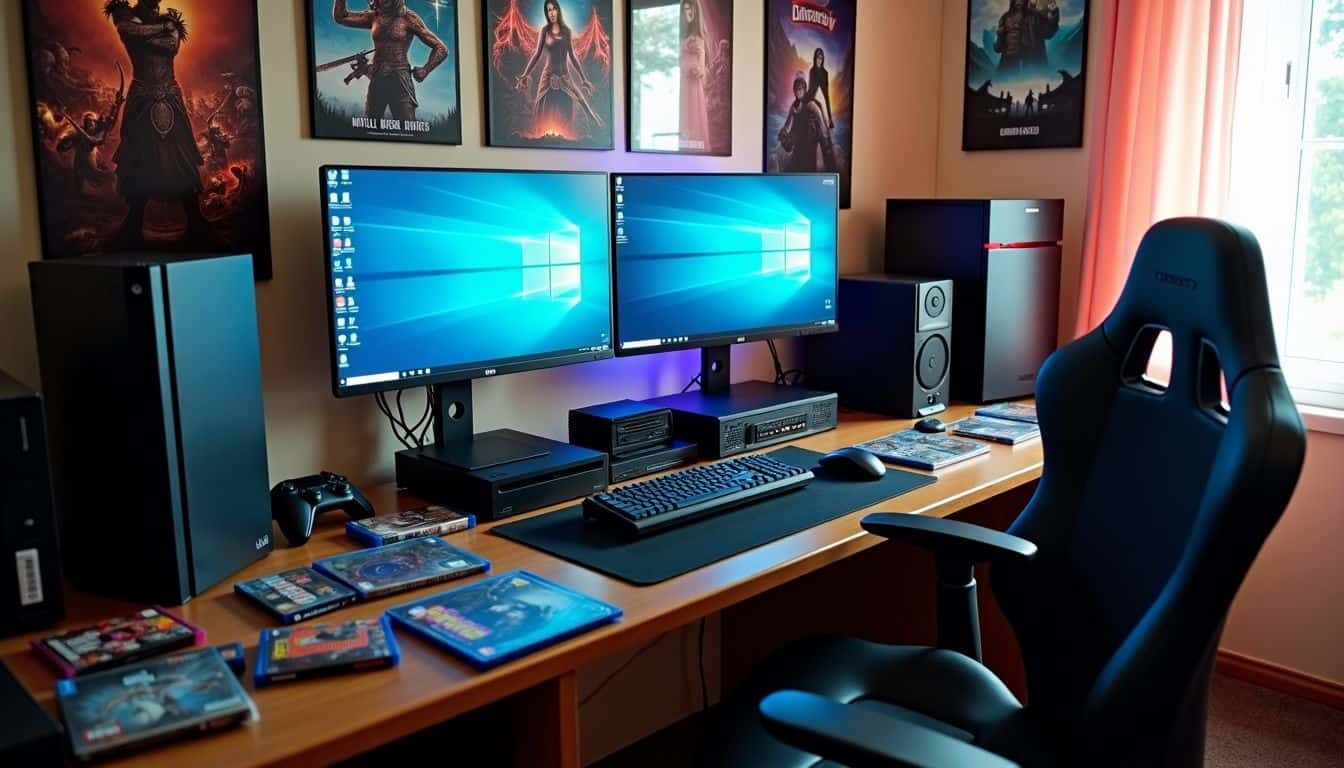
Gaming feeds geek culture, blending passion for virtual worlds with tech skills and rich imagination. Through communities like Twitch streams or Discord groups, geeks connect deeply over shared digital adventures.
Gaming as a Passionate Hobby
Esports now draws huge crowds, millions tune in to watch pro tournaments online. Fans gather by the thousands at Twitch streams, cheering teams on or debating gameplay tactics. Scholarships even reward top gamers these days, helping them go to college through skill alone.
For geeks who grew up hosting LAN parties or chatting on Gamespy servers until dawn—video games aren’t just for fun; they’re part of life.
Gamers bond over shared moments spent exploring new worlds through platforms like Giant Bomb, where identity and stereotypes spark long discussions late into the night. Spending hours mastering tough boss fights or collecting rare gear creates friendships that last beyond screens.
From retro Mario classics to epic Zelda quests—passion for gaming shapes geek culture today and remains central to our lives.
Games give you a chance to excel, and if you’re playing in good company you don’t even mind if you lose. — Gary Gygax
Technology and Geek Identity in Gaming
Geeks love tech, and gaming is at the center of their identity. With tools like Twitch and Discord, gamers connect with communities, share hacks, live-stream play sessions, or just chat about new trends in digital gaming.
Roughly 57% of Americans will be digital gamers by 2025—with Gen Zers leading the pack. By 2027 nearly three-fourths (75%) of all Gen Zers will game regularly online—often to build friendships through shared passions for games and gadgets.
For example: I often hop onto Discord after work to discuss strategies for my favorite indie RPGs with fellow fans across states—and even countries! Such common platforms shape how geeks blend technology into daily gamer habits—and make geek vs nerd labels clearer too.
Let’s now look deeper at key differences between Gamers, Nerds, and Geeks beyond ordinary stereotypes.
Differences Between Gamers, Nerds, and Geeks

Gamers might spend hours engaging in multiplayer battles online, while nerds often prefer quiet time exploring math puzzles or deep science facts. Geeks usually focus on tech projects, comics, or niche hobbies that they proudly show off at social events.
Social Behavior and Interaction
Video game players today are diverse, social, and connected—far beyond old stereotypes. Let’s look at how gamers differ from typical nerd or geek patterns in their social interactions:
- Nerds tend to keep to smaller groups that share focused intellectual interests—like math clubs or coding meetups—but gamers branch out widely. With online games like Fortnite and Valorant, high-ES (emotionally sensitive) players regularly connect with a broad network of friends.
- Geeks usually bond through passionate interests in comics, movies, or collectibles—not always needing direct interaction—but gaming communities thrive on active conversation. Platforms such as Discord offer real-time voice chats for sharing tactics, planning matches, or simply talking.
- Online multiplayer zones serve as “third places,” comfy spaces other than home and work; shy people use these digital hangouts to gain emotional support and build friendships over games like Minecraft.
- High-ES players often report more online friendships due to games such as World of Warcraft; this boosts their social circles and provides them a sense of belonging—even without meeting face-to-face.
- While nerd events, like science fairs or math competitions, may focus solely on skills rather than personal connection, gaming tournaments such as EVO encourage competition along with friendly connections between players.
- Unlike geeks who interact mostly through forums about niche hobbies—such as Star Trek fandom sites—video game fans embrace live streaming platforms like Twitch to engage socially with thousands worldwide.
- Games like Animal Crossing: New Horizons allow players to design islands together; this creative teamwork contrasts sharply with typical solo pursuits seen among traditional nerd communities focused mainly on individual achievement.
- Popular esports leagues—including League of Legends Championship Series (LCS)—show cooperative skills and camaraderie openly; this visibility helps break down old ideas linking game fans strictly with isolated behavior.
- Casual players jump onto mobile games briefly while waiting in line at the store; hardcore enthusiasts build long-lasting bonds over years playing MMORPGs like Final Fantasy XIV together—the range is wider than standard geek communities might see.
- Face-to-face meetups such as PAX Expo combine both digital play experiences and social encounters; unlike stereotypical nerd gatherings limited by narrow topics, these events draw mass audiences across generations for shared fun all weekend long!
Interests Beyond Gaming
Social behavior can paint gamers as geeks or nerds, but their other interests tell a fuller story. Gamers often enjoy hobbies far beyond screens and controllers:
- Popular franchises like Marvel or DC Comics draw many gamers into comic collecting. Events such as San Diego Comic-Con in July each year gather huge crowds, showing these passions cross paths for gaming geeks.
- Thousands of gamers love tabletop role-playing (RPG), such as Dungeons & Dragons, first published in 1974. Gathering friends around a table to build stories and battle monsters lets people connect face-to-face—not only online.
- Many gamers are fans of Japanese anime and manga series—for instance “Naruto” or “Attack on Titan.” Anime conventions across America often attract gamers who cosplay favorite characters from games and cartoons alike.
- Tech gadgets captivate many gamers—such as the latest Apple VR headset coming out soon, smart home devices like Amazon Alexa, or drones by DJI. New technology excites gamers eager to explore fresh possibilities beyond gaming consoles.
- Fantasy novels like J.R.R Tolkien’s “The Lord of the Rings” or Brandon Sanderson’s works appeal strongly to gaming audiences. Epic storylines from fantasy worlds help fuel imagination and offer new ideas for game creation.
- Some core players follow NASA missions closely—like Mars rover Perseverance landing in February 2021—and even join citizen science projects online to study space data firsthand.
- Outdoor sports don’t exclude hardcore gamers; some enjoy skateboarding, biking, hiking through national parks—even climbing mountains on weekends between intense game sessions at home.
- Maker communities attract tech-minded gamesters interested in creating with Raspberry Pi computers or Arduino microcontrollers—building robots, personalized lighting setups, or custom keyboards at home workshops.
- Music plays an important role: Many active gamers also play instruments such as electric guitars by Fender—or produce original songs digitally using software tools like Ableton Live during free time after matches online.
- Nature hobbies engage plenty of devoted players—from caring for houseplants bought on Etsy stores to birdwatching journeys guided by smartphone apps such as Merlin Bird ID by Cornell Lab of Ornithology.
Interests outside video gaming vary widely among geeky crowds today: passions taking them far away from stereotypes about isolated screen-bound enthusiasts alone!
Why Are Gamers Often Labeled as Nerds or Geeks?

Movies and shows often depict gamers as tech-obsessed outsiders, giving rise to popular labels. Old-school games like “Dungeons & Dragons,” and newer platforms such as Twitch streaming, also strengthen the nerd-geek connection today.
Historical Stereotypes of Gamers
Gamers often faced harsh stereotypes in the 1980s and 1990s. Media depicted them as socially awkward, shy loners who rarely stepped out of their rooms or basements. TV shows and films made fun of gamers, labeling them as reclusive nerds with poor social skills.
Sadly, these negative views linger today, despite shifts in culture and perception.
Though gaming is now widespread—with over 35% seeing “gamer” as a symbol of fun—old ideas still persist among some people. Less than 10% of players currently feel judged or embarrassed about being part of gaming culture.
Yet certain circles continue to wrongly label gamers as isolated geeks or antisocial individuals stuck behind screens all day long.
Media Representation of Gamers
Stereotypes aside, media plays a big role in shaping the gamer image. Films like “Ready Player One” (2018) often highlight gamers as tech-obsessed geeks chasing virtual adventures rather than real-life ones.
Shows such as Netflix’s 2021 series “Arcane,” based on the popular game League of Legends, depict gamers as passionate and skilled but socially awkward figures. In TV commercials, advertisers sometimes portray gaming fans strictly as young men glued to consoles.
This intense view ignores casual players and fails to capture how diverse gaming communities truly are today—spanning all ages, genders, and interests.
While older movies once mocked video games for laughs, modern shows now weave them into fascinating plots about technology or friendships built through play. Popular streaming platforms Twitch and YouTube spotlight gaming personalities with millions of followers—from expert esports competitors to funny casual streamers—which helps shift public views toward accepting games as everyday entertainment rather than mere geeky hobbies reserved for nerds alone.
Gaming has broken through stereotypes; it’s become part of daily life. — Phil Spencer, head of Xbox at Microsoft
The Evolving Image of Gamers
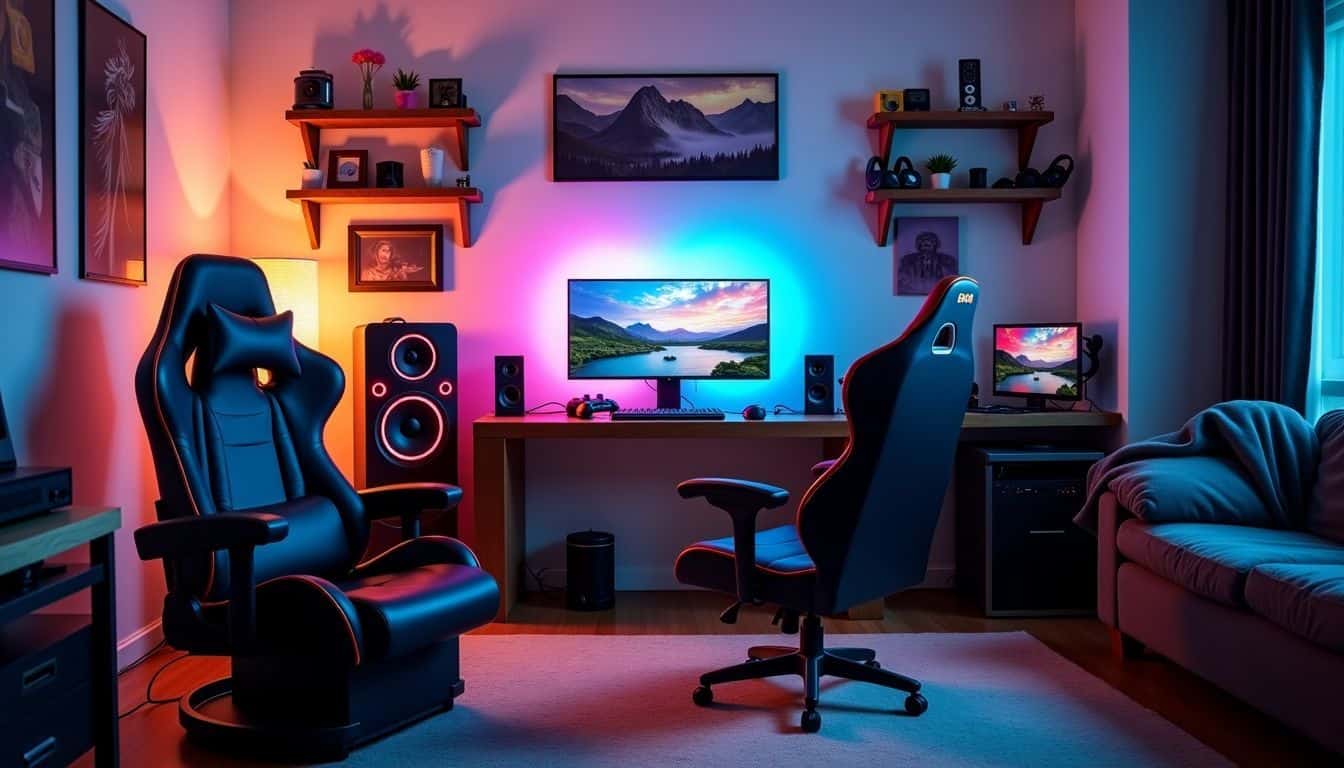
Gamers in 2025 now stand at center stage in popular shows, movies, and internet trends—breaking old stereotypes. Streaming platforms like Twitch and YouTube Gaming now shape a bold new image for gamers.
Gaming as a Mainstream Activity
Gaming has become central to modern culture, pulling in a wide range of people. Parents pass their love for video games down to children, creating multigenerational gamers. This makes gaming more popular than ever before—it’s now a common household hobby enjoyed by young and old alike.
The growth of diverse communities helps boost this mainstream shift. Around 47% of players have female gamer friends, showing that the activity reaches far beyond any one group or stereotype.
Players also spread their passion widely: 25% have introduced five or more new people to the gaming scene—expanding its appeal further into everyday American life.
Gamers in Pop Culture
Gamers are now heroes on big screens, TV shows, and even comics. Popular movies like “Ready Player One,” Netflix series such as “The Witcher,” and games turned into hit shows—think “Arcane” from League of Legends—all reflect gamers’ presence in pop culture.
Still, diversity issues persist; lead roles rarely feature people of color or nuanced mental health portrayals.
Since the 1980s, titles like “Final Fight” and later “Metal Gear Solid 2” have included non-heteronormative characters—but these examples remain rare today. While gaming narratives slowly embrace change, gamers often resist conversations around diversity and identity representation.
They’re more likely to value game mechanics over character backgrounds—even if stories shape our wider cultural view of players themselves.
Are All Gamers Nerds or Geeks?

Gamers come from diverse backgrounds and play with different levels of passion. They span a wide range—from casual mobile players to dedicated esports fans—and don’t always fit geek or nerd labels neatly.
Casual Gamers vs. Hardcore Gamers
Exploring gamer labels often leads to confusion, especially between casual and hardcore styles—here’s a quick breakdown:
| Trait | Casual Gamers | Hardcore Gamers |
|---|---|---|
| Typical Platform | Mobile devices, Nintendo Wii, Nintendo Switch | Gaming PCs, PlayStation 5, Xbox Series X |
| Time Invested | A few hours per week or less | Multiple hours per day, often daily |
| Game Complexity | Simple games like Candy Crush, Angry Birds, Mario Kart | Complex, strategic titles such as Elden Ring, Starfield, Final Fantasy XVI |
| Community Engagement | Limited social interaction, often solo play | Active online communities on Discord, Twitch, Reddit |
| Competitive Level | Relaxed, for entertainment | Competitive, involved in Esports events and challenges |
| Investment in Gaming Gear | Minimal, basic devices or consoles | High-end PCs, gaming chairs, VR headsets, specialized peripherals |
| Knowledge in Gaming Tech | Limited understanding, casual interest only | Advanced knowledge of GPUs, CPUs, frame rates, ray tracing |
| Game Library Size | Few games, often free-to-play or affordable titles | Large collection on Steam, Epic Games Store, Xbox Game Pass subscriptions |
| Identity as Gamers | Rarely identify strongly; gaming considered a leisure activity | Proud gaming identity, aspects of geek or nerd culture embraced |
Still, the casual-hardcore split is mostly outdated—what truly counts is how you see yourself as part of gaming culture, beyond labels or platforms.
Diversity in the Gaming Community
Casual and hardcore gaming continue to grow, but diversity still needs attention. Games like “Guild Wars 2” have made great strides by featuring LGBTQ characters and showing heroes dealing with mental health issues.
Yet lead roles for people of color remain scarce across game stories in 2025. Librarians actively speak out to boost the voices of underrepresented groups, pushing the community toward positive change.
Gamers often push back against conversations about diversity—but these discussions matter deeply. I’ve attended online forums where supportive comments spark helpful talk on inclusion and respect among geeks from many backgrounds.
More open-minded gamers now share personal truths that enrich our hobby space, yet there is more work ahead before equal representation becomes normal practice in games we play every day.
How Will Gaming, Nerd, and Geek Identities Transform in 2025?
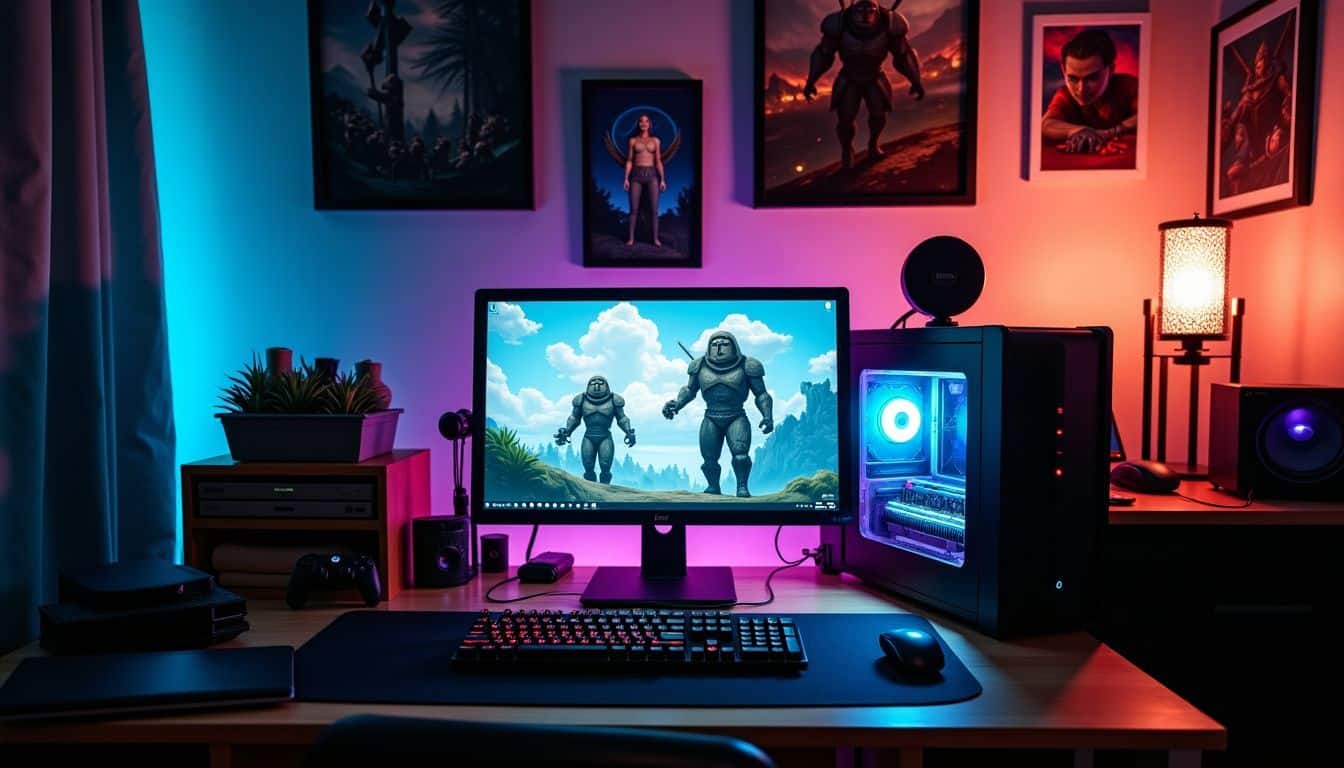
Gaming, nerd, and geek identities will see big changes in 2025 as new games and platforms arrive. The launch of anticipated titles like “Mafia: Old Country” could shift how people think about gamers—turning gaming into a more mainstream hobby for many.
Social media sites such as Discord and Twitch allow gamers to build strong communities online; this trend will grow further by 2025. These virtual spaces help players show their interests beyond gaming alone, combining tech skills with fun hobbies that shape fresh nerd and geek cultures.
In fact, the lines between gamer, nerd, and geek labels are already starting to blur—and community engagement is key here. Gamers now often use advanced gear—like VR headsets or streaming setups—to display both their passion for technology and games openly online.
In 2025, we may see even greater diversity within gamer groups as different backgrounds become part of one larger game world identity through shared experiences across digital spaces.
People Also Ask
Are gamers considered nerds or geeks in 2025?
In 2025, gamers can be either nerds or geeks—it depends on their interests and traits. Nerds usually dive deep into technical details and gaming strategies, while geeks often focus more on game culture, collectibles, and social connections.
What key traits help identify if a gamer is a geek?
Gamers who are geeks typically love sharing their passion openly—collecting gaming gear, joining fan communities online, attending events like conventions—and they enjoy connecting socially through games.
How do you know if a gamer fits the nerd category instead?
A gamer who’s more of a nerd tends to explore detailed aspects of gameplay mechanics—like mastering complex rules—or spends time analyzing game data carefully. They prefer understanding how things work behind the scenes rather than just playing casually.
Can someone be both a geek and a nerd when it comes to gaming?
Absolutely! Many gamers blend both categories easily—they might analyze every detail about game design yet still eagerly collect merchandise or join lively discussions with other fans online.
References
https://ankipro.net/blog/nerd-vs-geek/
https://flowingdata.com/2013/06/14/the-differences-between-a-geek-and-a-nerd/ (2013-06-14)
https://geekvibesnation.com/the-biggest-trends-shaping-geek-culture-in-2025/
https://www.emarketer.com/content/us-gamers-by-generation-2025 (2025-02-10)
https://pmc.ncbi.nlm.nih.gov/articles/PMC4080869/
https://www.aaaa.org/blog/guest-post-the-new-face-of-gaming-engaging-a-diverse-and-high-value-audience/ (2025-02-14)
https://www.techradar.com/news/gaming-has-shed-its-geeky-image-to-become-a-cool-hobby (2018-04-27)
https://www.criticalhit.net/gaming/the-spectrum-of-casual-vs-hardcore-gamers/
https://gamequitters.com/types-of-gamers/
https://www.libraryjournal.com/story/diversity-in-gaming-games-gamers-gaming (2017-09-13)
https://www.facebook.com/groups/nerdandproudtv/posts/2841256446026442/
https://nerdologists.com/2025/01/2025-nerds-year-resolutions/
